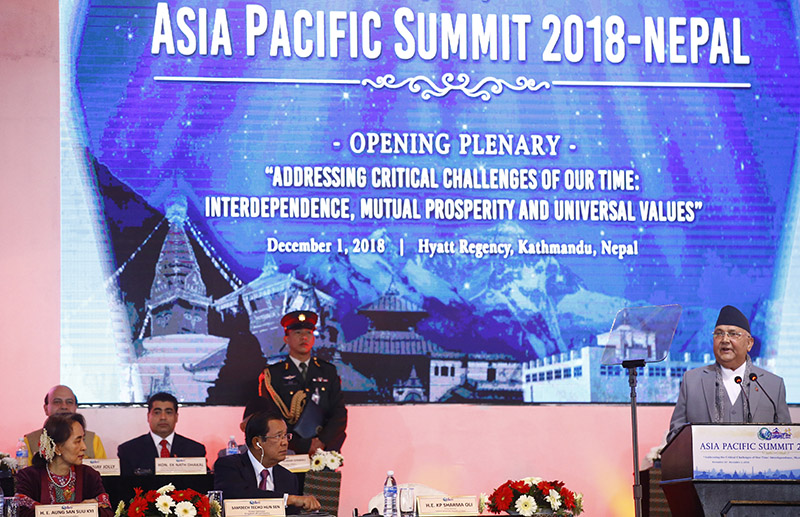Leaders stress joint efforts to eradicate poverty, illiteracy and fight terrorism
Kathmandu, December 1
Leaders today stressed on joint initiative for eradication of poverty and illiteracy, and fighting climate change and terrorism.
Addressing the Asia Pacific Summit 2018-Nepal, organised by South Korea-based Universal Peace Federation and supported by the Government of Nepal, the leaders stressed that these issues could be addressed only through cooperation.
In his inaugural speech, Prime Minister KP Sharma Oli said mankind faced several critical and sensitive issues at local, national, regional and global levels that warranted urgent attention.
Besides poverty, illiteracy and infectious diseases, the world continues to reel from the adverse impacts of climate change, natural and man-made disasters, and terrorism, according to the PM. “The irony is that the severest burden is felt by those who did not commit any fault. This is unacceptable. So, we very much emphasize the need for effective implementation of climate justice principle,” said PM Oli.
The prime minister suggested that problems could be addressed through promotion of peace and interdependence among nations, protection of natural ecosystems and habitat, and inculcation of universal values among the peoples.
PM Oli said the pursuit of peace had been a direct beneficiary of integration, inter-connections and interdependence, and integrative processes and interdependence had, in turn, led to globalisation resulting in greater harmony and cooperation.
“Reversal of these gains on any pretext may invite untold consequences,” he said. “For attaining the goal of universal peace and harmony, the pursuit of mutual prosperity is the path that countries rich and poor ought to walk together.”
PM Oli also highlighted Nepal’s recent political transformation and uniquely successful peace process, besides promulgation of the constitution by the elected representatives followed by successful three tiers of elections. Stating that the government’s agenda for socio-economic transformation is guided by the motto ‘Prosperous Nepal, Happy Nepalis’, he said the government had accorded top priority to rapid yet sustainable economic development.
PM Oli said a perfect blend of nature and culture made Nepal an attractive destination for tourists around the world and hoped the guests would visit Nepal again.
In her keynote address, Myanmar State Counsellor Aung San Suu Kyi said every challenge should be faced taking it as an opportunity, and common problems of the Asia Pacific region such as poverty could be addressed through collaboration.
Former Pakistan Prime Minister Syed Yousaf Raza Gillani said terrorism was one of the biggest challenges for the peace and development of the Asia Pacific region, and that the countries should accord highest priority to conflict resolution. “There’s nothing like good terrorists or bad terrorists, terrorists are terrorists,” he said.
Stating that the east was becoming a centre of development and economy, Gillani stressed boosting connectivity in the region. He said the ‘Belt and Road Initiative’, of which Pakistan was a part, would help boost connectivity in the region.
Former Indian Prime Minister HD Deve Gowda added that terrorism was violation of human rights and that terrorists should not be looked as ‘courageous people’. “Terrorism becomes more problematic when it is state sponsored. These issues should be addressed through international laws,” he said.
Citing Mahatma Gandhi’s saying that ‘there is enough on Earth for everybody’s need, but not enough for everybody’s greed’, Gowda said India was committed to mitigating climate change risks.
The inaugural event was also addressed by former Prime Minister Madhav Kuamar Nepal; Cambodia Prime Minister Hun Sen and Bharatiya Janata Party leader Vijay Jolly, among others.






